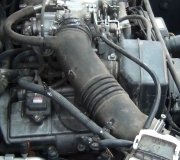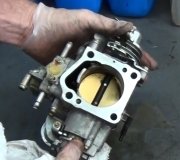With all the computing power available to the engineers who design engine packages, original intake manifolds are tuned really well already. They have to factor in the desired torque, which is a bragging right in their advertising, emissions, idle quality, and fuel mileage. It's not likely an aftermarket supplier is going to improve on all of those things. What you might find is the personality of the engine will be different, meaning it will make its most power in a different rpm range, and things like that, but if you improve one area, the trade-off is you'll lose in another area. If you gain in an area that's important to you, you're going to think it made an improvement.
What affects the personality of the engine has to do with the diameter and length of the "runners" that direct the air to each cylinder, but you have to match that with the diameter and length of the exhaust runners. I don't mean they have to be the same. "Matching" means tuning the intake and the exhaust passages to be most effective in the same characteristics you're after. That's why on NASCAR race cars, bigger isn't better in their exhaust headers. All the bends in the long tubes are because that is the length they want them to be and they have to twist each tube up to fit them in there.
Most of the aftermarket parts you're going to find will have a disclaimer "For off-road use only". That means they haven't been certified to comply with emissions standards or they haven't been tested. People still use them on street cars but if you have really restrictive emissions testing in your area, the vehicle may not pass inspection.
Remember too that liquid gasoline does not burn. It has to be a vapor to burn in the cylinders, and the intake manifold plays a big role in achieving that. When people think they're going to get blazing horsepower with cold air intakes, they're cooling the air so it condenses and they can pack more into the cylinders. Thanks to the intake air temperature sensor and the mass air flow sensor, the Engine Computer will respond by adding more fuel. In reality, a lot of that fuel never vaporizes, and it goes into the exhaust system where the catalytic converter has to clean it up. The only time you will notice more power is at wide-open-throttle. At all other speeds, you just won't have to push quite as far on the accelerator pedal while you're wasting that fuel.
If you care to learn more about intake manifolds and how they are fine tuned for the power band you're after, Chrysler used to have three or four really nice books from their "Direct Connection" performance parts division. They were all over an inch thick. One book was related to just engine modifications. GM had a similar book called "Chevy Power". It was about half an inch thick. I only saw one once a long time ago, so I don't remember everything it covered. Those books covered just the manufacturers' engines. There used to be a lot of "add-some-horsepower-to-your-car" magazines that covered theory real well, but they either didn't relate it to many specific engines, or they related the modifications to the GM 350 c.I. And you were on your own if you had something else.
Thursday, January 16th, 2014 AT 3:11 AM


